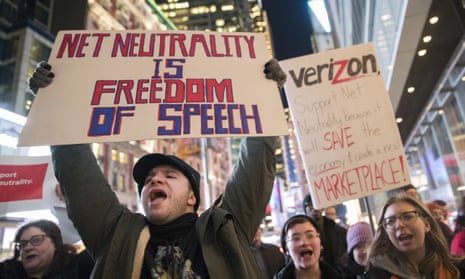The US justice department has sued the state of California, just hours after the state’s governor, Jerry Brown, signed legislation to restore internet protections known as net neutrality.
The justice department said it would take California to court on grounds that the federal government has the exclusive power to regulate net neutrality.
US attorney general Jeff Sessions said in a statement that “states do not regulate interstate commerce - the federal government does,” after California became the largest state to enact its own rules requiring internet providers to treat all web traffic equally.
“Once again the California legislature has enacted an extreme and illegal state law attempting to frustrate federal policy,” Sessions said in the statement.
Net neutrality advocates worry that without the rules, internet providers could create fast lanes and slow lanes that favour their own sites and apps or make it harder for consumers to see content from competitors.
Telecommunications companies lobbied hard to kill off the new California law or water it down, saying it would lead to higher internet and cellphone bills and discourage investments in faster internet. They argued that it was unrealistic to expect them to comply with internet regulations that differ from state to state.
The Trump administration repealed the Obama era rules on net neutrality in December 2017. The Federal Communications Commission voted 3-2 along party lines to repeal the rules that prevented internet companies from exercising more control over what people watch and see on the internet.
California attorney general Xavier Becerra said the Trump Administration was ignoring “millions of Americans who voiced strong support for net neutrality rules”, while California, which is “home to countless start-ups, tech giants and nearly 40 million consumers - will not allow a handful of power brokers to dictate sources for information or the speed at which websites load.”
The justice department lawsuit marked the latest clash between the Trump administration and California, which have sparred over environmental, immigration and other hot-button issues.
The Trump administration’s net neutrality repeal was a win for providers like Comcast Corp, AT&T Inc and Verizon Communications Inc, but it was opposed by internet companies like Facebook Inc, Amazon.com Inc and Alphabet Inc.
FCC Chairman Ajit Pai, who led the effort to reverse net neutrality, said in a statement that “not only is California’s internet regulation law illegal, it also hurts consumers. The law prohibits many free-data plans, which allow consumers to stream video, music, and the like exempt from any data limits.”
Jonathan Spalter, who heads USTelecom, an industry trade group, said California’s law will not “help advance the promise and potential of California’s innovation DNA.”
He argued that instead of 50 separate state laws, “we need Congress to step up with a national framework for the whole internet ecosystem and resolve this issue once and for all.”
In August, 22 states and a coalition of trade groups representing major tech companies urged a federal appeals court to reinstate the rules.
